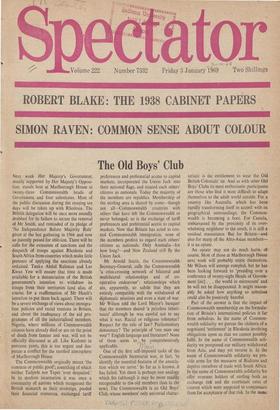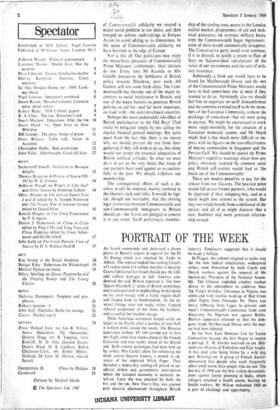The Old Boys' Club Next week Her Majesty's Government, stoutly
supported by Her Majesty's Opposi- tion, stands host at Marlborough House to twenty-three Commonwealth heads of Government and four substitutes. Most of the public discussion during the ensuing ten days will be taken up with Rhodesia. The British delegation will be once more soundly drubbed for its failure to secure the removal of Mr Smith, and reminded of its pledge of 'No Independence Before Majority Rule' given at the last gathering in 1966 and now so patently poised for oblivion. There will be calls for the extension of sanctions and the despatch of troops against Rhodesia and South Africa from countries which make little pretence of applying the sanctions already ordained. Tun.ku Abdul Rahman and Lee Kkvan Yew will ensure that time is made available for a denunciation of the British government's intention to withdraw its troops from their territories (and also, of course, for a reaffirmation of Mr Heath's intention to put them back again). There will be a severe exchange of views about immigra- tion policies and racial tensions in Britain, and about the inadequacy of the aid pro- grammes of all the industrialised members. Nigeria, where millions of Commonwealth citizens have already died or are on the point of death from famine and war, will not be officially discussed at all. Like Kashmir in previous years, this is too urgent and des- perate a conflict for the rarefied atmosphere of Marlborough House.
The Commonwealth originally meant 'the common or public good';, something of which neither Tadpole nor Taper 'ever despaired.' In its modern incarnation it was once a community of nations which recognised the British monarch as their sovereign, pooled their financial resources, exchanged tariff preferences and preferential access to capital markets, incorporated the Union Jack into their national flags, and treated each others' citizens as nationals. Today the majority of the members are republics. Membership of the sterling area is shared by some—though not all—Commonwealth countries with others that have left the Commonwealth or never belonged; so is the exchange of tariff preferences and preferential access to capital markets. Now that Britain has acted to con- trol Commonwealth immigration, none of the members profess to regard each others' citizens as nationals. Only Australia—for how long?—and New Zealand still fly the Union Jack.
Mr Arnold Smith, the Commonwealth Secretary-General, calls the Commonwealth 'a criss-crossing network of bilateral and multilateral relationships and of co- operative endeavour': relationships which are, apparently, so subtle that they are entirely compatible with the withdrawal of diplomatic missions and even a state of war. Mr Wilson told the Lord Mayor's banquet that the members shared 'a priceless inheri- tance' although he was careful not to say what it was. Racial or religious tolerance? Respect for the rule of law? Parliamentary democracy? The principle of 'one man one vote'? English language and literature? None of them seem to be comprehensively applicable.
One of the first self-imposed tasks of the Commonwealth Secretariat was, in fact, 'to identify the essential features of the associa- tion which we serve.' So far as is known, it has failed. Yet there is perhaps one analogy which fits (although it may be more readily recognisable to the, old members than to the new). The Commonwealth is an Old Boys' Club, whose members' only universal charac- teristic is the entitlement to wear the Old British Colonials' tie. And as with other Old Boys' Clubs its most enthusiastic participants are those who find it most difficult to adapt themselves to the adult world outside. For a country like Australia. which has been rapidly transforming itself in accord with its geographical surroundings,. the Common- wealth is becoming a bore. For Canada, embarrassed by the proximity of its over- whelming neighbour to the south, it is still a residual reassurance. But for Britain—and also for many of the Afro-Asian members— it is an opiate.
An opiate may not do much harm, of course. Most of those at Marlborough House next week will probably enjoy themselves. Mr Wilson will emerge rumpled, but he has been looking forward to 'presiding over a conference of twenty-eight Heads of Govern- ment [sic] . . . the world in microcosm' and he will not be disappointed. It might reason- ably be asked how anything so nebulous could also be positively baneful.
Part of the answer is that the impact. of Commonwealth membership on thelormula- tion of Britain's international policies is far from nebulous. In the name of Common- wealth solidarity we pursue the chifnera of a negotiated 'settlement' in Rhodesia involving obligations upon us that we cannot possibly fulfil. In the name of Commonwealth soli- darity we postponed our military withdrawal from Asia, and may yet reverse it. In the name of Commonwealth solidarity we pro- vide arms for the massacre of Biafrans and deprive ourselves of trade with South Africa. In the name of Commonwealth solidarity ive offer overseas holders of sterling both an exchange risk and the exorbitant rates of interest which were supposed to compensate them for acceptance of that risk. In the name of Commonwealth solidarity we created a major racial problem in our midst, and then reneged on solemn undertakings to Kenyan Asians to avoid adding to its dimensions. In the name of Commonwealth solidarity we have hovered on the edge of Europe.
Nor is this all. Our politicians may enjoy the masochistic pleasures of Commonwealth Prime Ministers' conferences: their electors do not. Every time Mr Kaunda or Mrs Gandhi denounces the feebleness of British policy towards Rhodesia, next week Alf Garnett will win some fresh allies. The Com- monwealth has become one of the major in- centives to racial intolerance in Britain. and one of the major barriers to generous British policies on aid for—and far more important, on trade with----the underdeveloped countries.
Perhaps this most undesirable side-effect of British participation in the Old Boys' Club could he mitigated simply by not calling the regular biennial general meetings. But quite apart from the fact that there is no reason why we should prevent the rest from fore- gathering if they still wish to do so, this alone would not secure the essential adaptation of British political attitudes. So what we must do is to act on the very threat that many of our partners have used against us so success- fully in the past. We should withdraw our membership.
The consequential effects of such a de- cision would be minimal, mainly confined to the Oucen's style and titles. It would be logi- cal. though not inevitable, that the existing legal distinction between Commonwealth and non-Commonwealth immigrants to Britain should go—the Tories are pledged to remove it in any event. Tariff preferences, member- ship of the sterling area, access to the London capital market, programmes of aid and tech- nical assistance, UK overseas military bases, even the Commonwealth Sugar Agreement: none of these would automatically disappear. The Conservative party could even continue, if it so desired, to justify a return to East of Suez on 'balance-sheet calculations' of the value of our investments and the cost of mili- tary insurance.
Admittedly a fresh use would have to be found for Marlborough House. and the rest of the Commonwealth Prime Ministers would have to find somewhere else to meet if they wanted to do so. Admittedly also we should feel free to negotiate on tariff dismantlement and the common external tariff with the mem- bers of the European Community without the prickings of conscience—but we were wing to anyway. We might be encouraged to work more single-mindedly for the creation of a European monetary system, and Mr Heath might find it that much more difficult to im- press with his figures on the cost-effectiveness of marine commandos in Singapore and the Persian Gulf. We should be spared the Prime Minister's repetitive warnings about how any policy obviously inspired by common sense and British self-interest would lead to 'the break-up of the Commonwealth.'
These are modest penalties to pay for the release from our illusions. The heaviest price would fall on our former partners, who would be deprived of their whipping-boy, and as.a result might lose interest in the system. But they too would benefit front withdrawal of the opiate: and all of us might discover that a new, healthier and more generous relation- ship ensued.



































